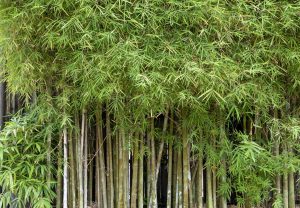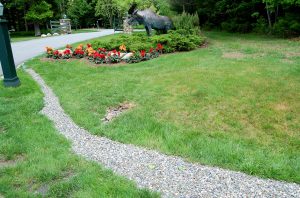You’re finally ready to tackle that yard redo but you have a lot of questions: what to plant, where to plant it and — last but not least — how much green you should spend on your green space.
The latter in particular is tricky to answer, because, among home renovation projects, landscaping is one of the most varied out there — there’s a lot of ground to cover, estimate-wise. To give you a rough sense, the average cost of landscaping per square foot (as it’s generally calculated) ranges from $4.50 to $12, according to contractor search site Angi.
That equates to $1,500-$5,000 for the average front yard ($3,496 is the average spend) and $15,000 to $50,000 for the average backyard (a full redo). Backyards are harder to average, since landscaping can vary so, from swimming pools to covered patios, from a few new plants to an elaborate, solar-paneled pergola. But for just the basics, figure on $3,000 to $15,000 for sod, walkways, bushes and trees. Fixr.com puts the average at $10,000.
10%
Source:Angi
Landscaping project costs
If you’ve got no green thumb, turn to the pros for your project. A professional landscaper or landscaping company (charging an average hourly rate of $50 to $100, Angi says) can tackle a variety of tasks, from developing a plan to purchasing materials and installing plants.
For a more significant remodel, consider hiring a landscape designer or architect (with an average hourly rate of $50-$150). This sort of pro will design the space and recommend plants, while a landscape architect will also advise on the type and placement of hard structures, like a gazebo or waterfall.
| Sprinkler installation | $1,673-$3,547 |
| Deck installation | $4,157-$11,887 |
| Outdoor lighting installation | $2,000-$6,000 |
| Fountain installation | $929-$4,715 |
| Pond installation | $335-$10,500 |
| Lawn seeding | $438-$1,694 |
| Sod | $1,060-$3,000 |
| Flower garden planting | $800-$3,000 |
| Patio installation | $1,953-$5,722 |
Sprinkler system
By installing a sprinkler system, you won’t need to worry about watering your plants. More common in drier climates, these systems are typically installed underground, with only the sprinkler heads visible above ground.
Deck
Decks are a perennially popular way to expand your external living quarters. The cost to install a deck varies greatly, depending on the size, number of levels, and materials, whether wood or composite.
Outdoor lighting
By adding lighting, your yard becomes usable into the wee hours. Costs for outdoor lighting hinge on the number and type of lights plus their distance from electrical outlets. LED lights tend to have the highest ROI, says Angie Hicks, Chief Customer Officer, Angi, and Co-Founder, Angie’s List.
Fountain and pond
Water features can serve as garden centerpieces and add soothing sounds. Costs vary depending on the size and materials. Expect to spend more if you line and filter your pond and include plants, fish or turtles.
Lawn seeding or sodding
Lawn seeding is more affordable than installing sod. However, with sod, you reap the instant gratification of a lawn. With seeding, you wait for the grass to grow.
Flower garden
Adding color and texture to your yard, a flower garden can range from a simple bed with plantings to a more elaborate area, with walkways, a trellis and a gazebo.
Patio
Perhaps the most common add-on, patios truly make a yard an outdoor room for entertaining, relaxing or even working. The cost depends on the size and materials.
The main types of landscaping
Experts break down landscaping into three main categories: softscaping, hardscaping, and xeriscaping. Here’s a look at each one, with their costs courtesy of Angi.
Landscaping TypeTypical Cost
| Softscaping | $800-$10,000 |
| Hardscaping | $300-$30,000 |
| Xeriscaping | $3,000-$24,000 |
What is softscaping and what does it cost?
Softscaping covers all plant life, including flowers, trees, shrubs, and grass. On average, expect to spend $800 to $10,000.
What is hardscaping and what does it cost?
Hardscaping includes all non-living elements, like structures, patios, and lighting. The cost can range from $300 to $30,000 depending on the project scope, running an average of $5 to $25 per square foot.
What is xeriscaping and what does it cost?
Xeriscaping refers to projects that aim to reduce water usage. Encompassing plants and systems, the average cost to xeriscape a yard is $17,000, but ranges from $3,000 to $24,000.
Landscaping maintenance costs
Expect your yard to require ongoing TLC. Without regular upkeep, you’ll ultimately spend more time and money on repairs and clean-up. Here are a few common maintenance chores and their prices.
— Weed control: Uproot unwanted greenery on a regular basis.
— General cleanup: Weed, dead-head, mulch, and more for tidy and attractive landscaping.
— Tree trimming and removal: Trim large trees to keep them healthy and lessen the chances their branches will fall on your home or yard. Remove trees that are dead or could pose a threat or interfere with your landscaping plan. Hire a pro for larger trees and, if it’s in your budget, ask them to remove and grind stumps.
— Lawn fertilization: Consider fertilizing once or twice a year to help grass grow and discourage weeds.
Here are average price ranges for common landscaping projects:
| Weed control | $70-$150 |
| General cleanup | $190-$1,000 |
| Tree trimming | $75-$1,800 |
| Tree removal | $200-$2,000 |
| Tree stump removal | $300-$500 |
| Tree stump grinding | $170-$500 |
| Lawn fertilization | $76-$394 |
Tips for lowering landscaping costs
Try these strategies to prune your landscaping expenses (pun intended).
— DIY. Even if you’re not big on hammering, hauling or gardening, consider handling simple projects, like laying mulch or paver stones, yourself.
— Give pros a starting point. To reduce their hours, approach landscape architects or designers with a basic design plan and budget.
— Keep existing softscape, especially trees. Trees can be expensive to purchase and install. Try to incorporate existing plantings into your plan so you avoid the time- and money-consuming removal process.
— Replace mulch with pavers or rocks. Rocks and gravel are often less expensive and require less long-term maintenance than soil and grass.
How do I pay for landscaping?
Think about financing large projects — the ones that stray into the upper-four or five figures with one of these methods.
Personal loan
This type of loan, aka a home improvement loan, is ideal for a one-time need like a large landscaping project, says Paul Turner, Spokesperson, Wells Fargo. Payments are predictable (they won’t change), and you won’t need to secure the loan with collateral, he adds.
Home equity line of credit (HELOC)
With a home equity line of credit, you gain access to a flexible line of credit secured by the equity you’ve built up in your property, says Matt Vernon, Head of Retail Lending, Bank of America. You’ll have access to the funds you need without draining your savings or disrupting your day-to-day finances, he explains. Plus, the interest you pay on this type of loan may be tax-deductible.
Home equity loan
With a home equity loan, you also tap into your home’s equity, but you get the entire loan amount up front. That means you’ll be charged interest on the whole amount, no matter how much of it you actually use.
Is landscaping worth the money?
Landscaping can add beauty to your home, extend your living space, and boost the value of your property. In HomeLight’s “Spring 2023 Top Agent Insights” report, real estate pros estimate a landscaping upgrade adds $7,312 in value to a home — not a bad ROI if you’ve spent the front-yard average $3,500.
And if you’ve spent more? “Landscaping can increase your property value by an average of 7 percent — and even if you don’t get close to that number, simple landscaping projects can have a major impact on your home’s curb appeal,” says Hicks.
Of course, different projects offer different returns. Landscaping maintenance and upgrades tend to recoup 100 percent of their cost, the National Association of Realtors (NAR) “2023 Remodeling Impact Report: Outdoor Features” says. More elaborate and expensive hardscaping (lighting, patios and decks, pergolas, pools) returns a lot less, recouping anything from 56 percent to 95 percent of their outlay, according to the NAR report, and predicting how they’ll boost a home’s resale value is trickier. Some people don’t like to swim or want the upkeep. Usually, though, anything that expands a home’s viable living space enhances its worth in prospective buyers’ eyes.
And in the meantime, beautiful landscaping adds to your enjoyment of your property as well.
Key takeaways
— Landscaping averages $1,500-$5,000 for front yards, $15,000 to $50,000 for backyards.
— There are three types of landscaping: softscaping (plants and living things), hardscaping (structures and pathways) and xeriscaping (drought-friendly systems and plants).
— Landscaping can add beauty to your home, extend your living space, and boost the value of your property by around 7%.
Read the full article here














